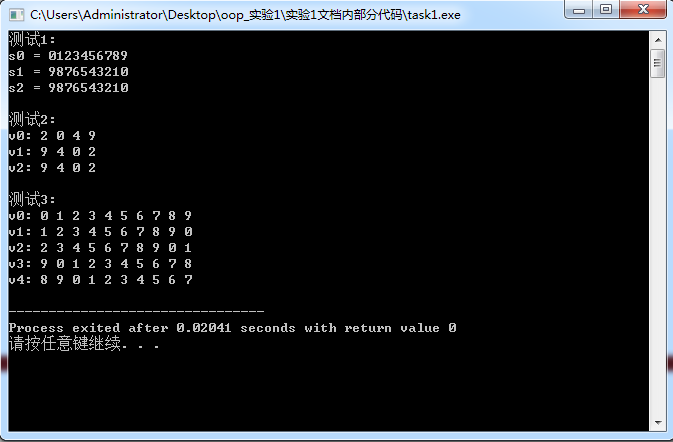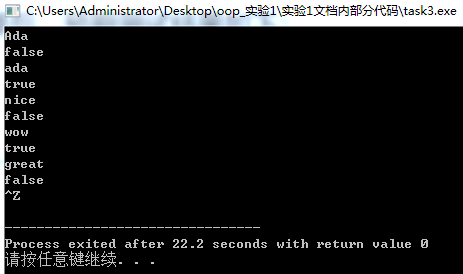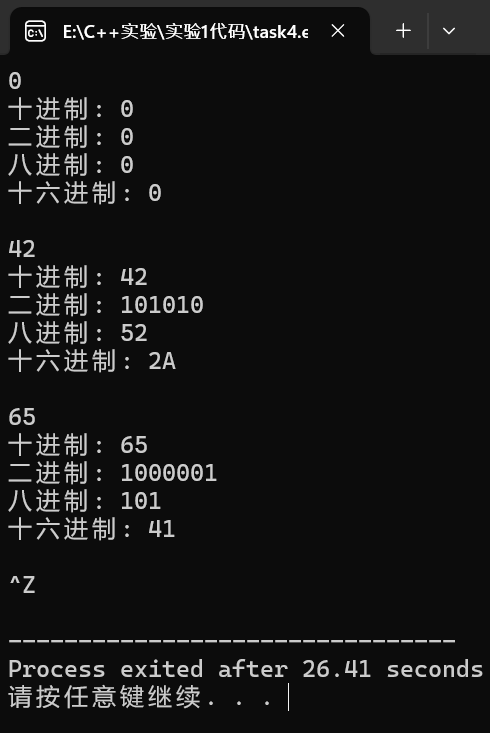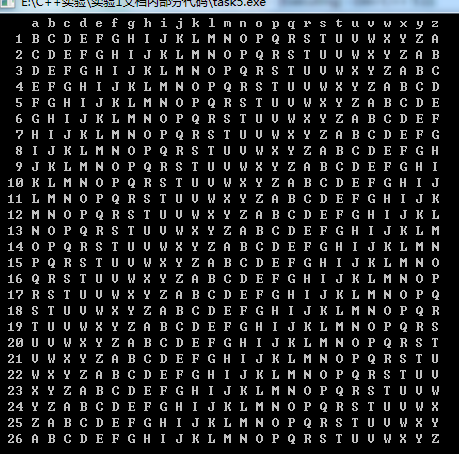实验任务1:
实验代码:
1 #include <iostream> 2 #include <string> 3 #include <vector> 4 #include <algorithm> 5 6 using namespace std; 7 8 // 声明 9 // 模板函数声明 10 template<typename T> 11 void output(const T &c); 12 13 // 普通函数声明 14 void test1(); 15 void test2(); 16 void test3(); 17 18 int main() { 19 cout << "测试1: \n"; 20 test1(); 21 22 cout << "\n测试2: \n"; 23 test2(); 24 25 cout << "\n测试3: \n"; 26 test3(); 27 } 28 29 // 函数实现 30 // 输出容器对象c中的元素 31 template <typename T> 32 void output(const T &c) { 33 for(auto &i: c) 34 cout << i << " "; 35 cout << endl; 36 } 37 38 // 测试1 39 // 组合使用算法库、迭代器、string反转字符串 40 void test1() { 41 string s0{"0123456789"}; 42 cout << "s0 = " << s0 << endl; 43 44 string s1{s0}; 45 reverse(s1.begin(), s1.end()); // 反转指定迭代器区间的元素 46 cout << "s1 = " << s1 << endl; 47 48 string s2{s0}; 49 reverse_copy(s0.begin(), s0.end(), s2.begin()); // 将指定迭代区间的元素拷贝到指定迭代器开始的目标区间,并且在复制过程中反转次序 50 cout << "s2 = " << s2 << endl; 51 } 52 53 // 测试2 54 // 组合使用算法库、迭代器、vector反转动态数组对象vector内数据 55 void test2() { 56 vector<int> v0{2, 0, 4, 9}; 57 cout << "v0: "; 58 output(v0); 59 60 vector<int> v1{v0}; 61 reverse(v1.begin(), v1.end()); 62 cout << "v1: "; 63 output(v1); 64 65 vector<int> v2{v0}; 66 reverse_copy(v0.begin(), v0.end(), v2.begin()); 67 cout << "v2: "; 68 output(v2); 69 } 70 71 // 测试3 72 // 组合使用算法库、迭代器、vector实现元素旋转移位 73 void test3() { 74 vector<int> v0{0, 1, 2, 3, 4, 5, 6, 7, 8, 9}; 75 cout << "v0: "; 76 output(v0); 77 78 vector<int> v1{v0}; 79 rotate(v1.begin(), v1.begin()+1, v1.end()); // 旋转指定迭代器区间[v1.begin(), v1.end())之间的数据项,旋转后从迭代器v1.begin()+1位置的数据项开始 80 cout << "v1: "; 81 output(v1); 82 83 vector<int> v2{v0}; 84 rotate(v2.begin(), v2.begin()+2, v2.end()); 85 cout << "v2: "; 86 output(v2); 87 88 vector<int> v3{v0}; 89 rotate(v3.begin(), v3.end()-1, v3.end()); 90 cout << "v3: "; 91 output(v3); 92 93 vector<int> v4{v0}; 94 rotate(v4.begin(), v4.end()-2, v4.end()); 95 cout << "v4: "; 96 output(v4); 97 }
实验截图:
实验任务2:
实验代码:

#include <iostream> #include <vector> #include <string> #include <algorithm> #include <numeric> #include <iomanip> using namespace std; // 函数声明 // 模板函数声明 template<typename T> void output(const T &c); // 普通函数声明 int rand_int_100(); void test1(); void test2(); int main() { cout << "测试1: \n"; test1(); cout << "\n测试2: \n"; test2(); } // 函数实现 // 输出容器对象c中的元素 template <typename T> void output(const T &c) { for(auto &i: c) cout << i << " "; cout << endl; } // 返回[0, 100]区间内的一个随机整数 int rand_int_100() { return rand() % 101; } // 测试1 // 对容器类对象指定迭代器区间进行赋值、排序 void test1() { vector<int> v0(10); // 创建一个动态数组对象v0, 对象大小为10 generate(v0.begin(), v0.end(), rand_int_100); // 产生[0, 100]之间的随机整数赋值给指定迭代器区间[v0.begin(), v0.end())内的每个数据项 cout << "v0: "; output(v0); vector<int> v1{v0}; sort(v1.begin(), v1.end()); // 对指定迭代器区间[v1.begin(), v1.end())内数据项进行升序排序 cout << "v1: "; output(v1); vector<int> v2{v0}; sort(v2.begin()+1, v2.end()-1); // 对指定迭代器区间[v1.begin()+1, v1.end()-1)内数据项进行升序排序 cout << "v2: "; output(v2); } // 测试2 // 对容器类对象指定迭代器区间进行赋值、计算最大值/最小值/均值 void test2() { vector<int> v0(10); generate(v0.begin(), v0.end(), rand_int_100); cout << "v0: "; output(v0); auto iter1 = min_element(v0.begin(), v0.end()); cout << "最小值: " << *iter1 << endl; auto iter2 = max_element(v0.begin(), v0.end()); cout << "最大值: " << *iter2 << endl; auto ans = minmax_element(v0.begin(), v0.end()); cout << "最小值: " << *(ans.first) << endl; cout << "最大值: " << *(ans.second) << endl; double avg1 = accumulate(v0.begin(), v0.end(), 0)/v0.size(); cout << "均值: " << fixed << setprecision(2) << avg1 << endl; cout << endl; vector<int> v1{v0}; cout << "v0: "; output(v0); sort(v1.begin(), v1.end()); double avg2 = accumulate(v1.begin()+1, v1.end()-1, 0)/(v1.size()-2); cout << "去掉最大值、最小值之后,均值: " << avg2 << endl; }
实验截图:
实验任务3:
实验代码:

#include <iostream> #include <string> #include <algorithm> bool is_palindrome(std::string s); int main() { using namespace std; string s; while(cin >> s) // 多组输入,直到按下Ctrl+Z后结束测试 cout << boolalpha << is_palindrome(s) << endl; } // 函数is_palindrom定义 // 待补足 // ××× bool is_palindrome(std::string s) { using namespace std; string s1{s}; reverse(s1.begin(), s1.end()); if(s == s1) return true; else return false; }
实验截图:
实验任务4:
实验代码:

#include <iostream> #include <string> #include <algorithm> std::string dec2n(int x, int n = 2); int main() { using namespace std; int x; while(cin >> x) { cout << "十进制: " << x << endl; cout << "二进制: " << dec2n(x) << endl; cout << "八进制: " << dec2n(x, 8) << endl; cout << "十六进制: " << dec2n(x, 16) << endl << endl; } } // 函数dec2n定义 // 待补足 // ××× std::string dec2n(int x, int n) { if (x == 0) return "0"; std::string result; while (x != 0) { int remain = x % n; if (remain < 10) { result += (remain + '0'); } else { result += (remain - 10 + 'A'); } x /= n; } std::reverse(result.begin(), result.end()); return result; }
实验截图:
实验任务5:
实验代码:

1 #include <iostream> 2 #include <iomanip> 3 #include <vector> 4 #include <algorithm> 5 using namespace std; 6 template <typename T> 7 void output(const T &c) { 8 for(auto &i: c) 9 cout << i << " "; 10 cout << endl; 11 } 12 int main() { 13 cout << setw(5) << 'a'; 14 for(char i = 98; i < 123 ;i++) 15 cout << setw(2) << i; 16 cout << endl; 17 vector<char> v0{'B', 'C', 'D', 'E', 'F', 'G', 'H', 'I', 'J', 'K', 'L','M', 'N', 'O', 'P', 'Q', 'R', 'S', 'T', 'U', 'V', 'W', 'X', 'Y', 'Z', 'A'}; 18 for(int j = 1; j < 27; j++) { 19 cout << setw(3) << j << setw(2); 20 vector<char> v1{v0}; 21 rotate(v1.begin(), v1.begin()+j-1, v1.end()); 22 output(v1); 23 } 24 }
实验截图:
实验任务6:
实验代码:

1 #include <iostream> 2 #include <iomanip> 3 #include <cstdlib> 4 #include <ctime> 5 6 int main() { 7 using namespace std; 8 9 srand(std::time(nullptr)); 10 int num = 10; 11 int correctAnswers = 0; 12 13 for (int i = 0; i < num; i++) { 14 int a = rand() % 10 + 1; // 生成1到10的随机数 15 int b = rand() % 10 + 1; // 生成1到10的随机数 16 char operation; // 运算符 17 int answer; 18 19 // 随机选择运算符 20 int opType = rand() % 4; 21 switch (opType) { 22 case 0: // 加法 23 operation = '+'; 24 answer = a + b; 25 cout << a << " + " << b << " = "; 26 break; 27 28 case 1: // 减法 29 if (a <= b) swap(a, b); // 确保 a 大于 b 30 operation = '-'; 31 answer = a - b; 32 cout << a << " - " << b << " = "; 33 break; 34 35 case 2: // 乘法 36 operation = '*'; 37 answer = a * b; 38 cout << a << " * " << b << " = "; 39 break; 40 41 case 3: // 除法 (确保能整除) 42 b = (rand() % 9 + 1); // 生成1到9的随机数作为被除数 43 a = b * (rand() % (10 / b) + 1); // 生成能整除的数 44 operation = '/'; 45 answer = a / b; 46 cout << a << " / " << b << " = "; 47 break; 48 } 49 50 // 获取用户输入 51 int userAnswer; 52 cin >> userAnswer; 53 54 // 判断用户答案 55 if (userAnswer == answer) { 56 correctAnswers++; 57 } 58 } 59 60 double accuracy = correctAnswers * 100 / num; 61 cout << fixed << setprecision(2); 62 cout << "正确率: " << accuracy << "%" << endl; 63 64 return 0; 65 }
实验截图:



